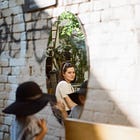1.
We think we know ourselves, but we don’t. Not really. The irony is—we’re the only ones who can. This is how lonely a human life can be.
So we must try to understand ourselves more deeply—because if we don’t, no one else stands a chance of truly knowing us.
“Go into yourself and see how deep the place is from which your life flows” - Rilke, Letters to a Young Poet.
Perhaps this is one of our life’s main tasks.
2.
Why does my body freeze when I hear my children cry and scream?
I was reprimanded for crying as a child. It was seen as a weakness, as something that made others uncomfortable. So I became the strong one—the one who doesn’t cry, not even in grief.
These reactions aren’t just habits. They are echoes of our earliest lessons absorbed long before we had words for them. What began as a way to stay safe and be loved becomes something deeper: a core belief. In psychology, core beliefs are the unconscious truths we adopt about ourselves, others, and the world.
That’s why I struggle with what success means.
That’s why I feel the need to be right and to be heard.
That’s why I fiercely protect my agency and autonomy.
That is why I am eternally seeking that elusive freedom.
3.
Life seems to move in a straight-line story plot like mine—from childhood to working adulthood, then I broke free to travel the world with my trusty backpack, met the love of my life, and now spend most of my time nurturing two young ones.
But it is more like an eternal loop from what we were to what we are now. Subconsciously, we are constantly pulled back to where we came from, regardless of how far we have grown or believe we have changed.
We are like branches, ever reaching for the sun and stretching far and beyond, yet ultimately, we are still connected to the trunk and the roots where we all started. And those earliest roots? They’re often the strongest.

4.
Some scientists believe that our core beliefs are set and unchangeable once formed. This has since been debunked. Thanks to neuroscience and studies in neuroplasticity, we now know that the brain can change throughout life, including patterns, habits, and core beliefs.
Changing deeply rooted core beliefs is more challenging, but it is still possible with conscious effort.
I have seen myself transformed. When I was young, money was scarce and the source of many of our problems, causing the formation of a core belief—money is the answer to everything, the source of happiness. Spoiler alert: It is not.
Luckily, I learned this early on when I started earning more than I could spend during my career as an independent tech consultant. My bank account grew, but nothing else changed. I still lived simply, still found joy in small things.
Watching one of my core beliefs fall apart under the spotlight was unsettling.
But I won’t sugarcoat this: money is essential—to a point. Without it, the weight of survival overshadows everything else. I’m not speaking of abundance, but of the dignity that comes with self-sufficiency.
5.
I’ve spent a good part of my life trying to understand myself.
A decade ago, during a season of soul-searching, I dove into philosophy, personality theories, and late-night journaling, asking the big question: Who am I, really?
That was when I discovered the MBTI and true to type, I became mildly obsessed. As an INTP—often called “The Thinker”—I analyzed myself and everyone around me. I tried other personality tests too, always curious to find new perspectives on who I am.
And yet, even after all these tests and going down countless rabbit holes, I still find parts of me that I’ve never noticed before.
In a recent leadership training, we began by looking inward—back to where it all began. Despite having exercised my self-reflection muscles, it was still hard.
Each time we trace a root, we see how deep it runs—and how it has shaped the trunk and the branches above.
It is when we recognize one of the core beliefs we’ve unknowingly carried all this time, we reclaim the power to choose how to use it.
6.
One of my core beliefs is that I am strong and must protect my freedom at all costs.
When I was an infant, I was given to a nanny at just two months old. While I was still adjusting to a new caregiver, I was passed on again—this time to my Lai Ma, who thankfully took me under her wing until I was five. After that, I was once again removed from my primary caregiver and had to adapt to a new environment with my biological family.
These events shaped me into who I am—an independent person who fiercely protects her agency and freedom.
This belief buoyed me as I moved abroad, learned a new language, and created a new life here while navigating motherhood far away from my family and closest friends.
I pushed through not speaking the language at first, on multiple rejections and mounting bureaucracy, getting only a cold meal of bread and cheese after 20 hours of labor and endless nights with a crying baby.
“If you want to survive in this world, you gotta do it yourself,” said the little me, hugging her comfort pillow tight while curled up under the blanket.
This core belief, though, has many limiting qualities. I find it extremely difficult to ask for help, and I find it challenging to commit to things that would threaten my sovereignty and freedom.
Two years ago, after being sick for more than four weeks, having woken up from a fitful sleep on a Saturday did I crawl out to my husband asking him to get his sister to help. That took all of me to say I needed to rest and recuperate.
7.
One exercise in the same training is to find the opposite of your core belief. When you write it or speak it out, it should make you squirm. And if you're lucky, you might stumble upon a Sehnsucht feeling—a longing for something that gives you angst, but you kind of wish you had it or even wanted it.
It is like a path in a beautiful, mysterious forest you never took but often dreamt about.
All my life, I’ve equated freedom with safety. But Sehnsucht showed me another kind—the longing to be lost, to belong without needing to fight to keep it.
I experienced all that during my traveling days, letting go of control and exploring the unknown, including not needing to achieve anything and just being. That said, I still clung to one thing—my freedom. I kept my passport close, tucked in a travel waist pack like it was the most valuable thing on earth.
8.
I see now why motherhood is a contradiction to me.
Being a mother requires humility. It requires admitting that you cannot do it alone, not if you want to do it well without breaking.
Being a mother means losing a certain amount of freedom. You are tethered now. Life is no longer just your own.
Being a mother requires letting go of a certain amount of carefreeness. But it also requires relinquishing control.
“They (your children) come through you but not from you, And though they are with you yet they belong not to you” - Khalil Gibran, On Children.
9.
We may not be able to pull out our roots—doing so might topple the tree.
But we can learn to live with them, recognize when they serve or limit us, and choose our reactions accordingly.
It is about leaving the well-trodden path when needed and forging a new one through the beautiful, mysterious forest. It won't be easy, but it will be worth it.
This is the lifelong work of becoming. This is the way of conscious living.
Ironically, Carl Jung, who inspired MBTI, a tool that neatly fits everyone into boxes, deeply believed in transcendence and transformation—the journey beyond labels and towards discovering one's whole self.
“The privilege of a lifetime is to become who you truly are.” - Carl Jung in Memories, Dreams, Reflections.
And hopefully, one day, we’ll see the tree flourish—still rooted, but branching into the whole self.
If you're interested in the methods on how to determine your core beliefs, reflect on how they have brought you to where you are and how they are now still serving or limiting you today, and how to walk the uncharted path through your own beautiful, mysterious forest, look out for next week’s Conscious Living Practice 🙂
What core belief have you embraced—and is it still serving you?





Fascinating! There is much to unpack here. I will have to re-read and take a closer look - at myself.
One, this is a beautiful piece ❤️
Two, I am awestruck at how similar our remembering of our youth were based on these words and my most recent piece:
"I was reprimanded for crying as a child. It was seen as a weakness, as something that made others uncomfortable..."
Feels surreal and like solidarity.